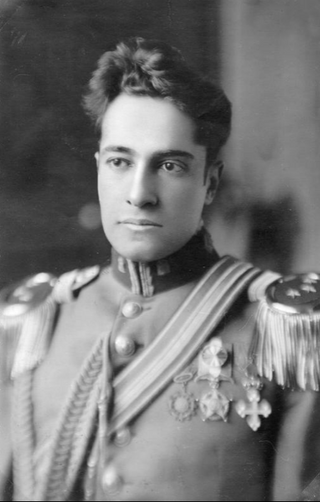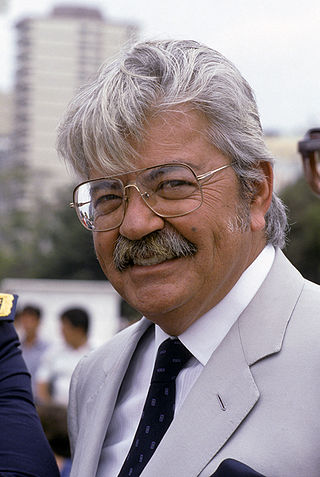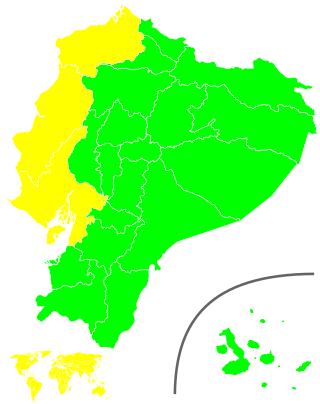
The politics of Ecuador are multi-party. The central government polity is a quadrennially elected presidential, unicameral representative democracy. The President of Ecuador is head of state and head of the army on a multi-party system, and leads a cabinet with further executive power. Legislative power is not limited to the National Assembly, as it may to a lesser degree be exercised by the executive which consists of the President convening an appointed executive cabinet. Subsequent acts of the National Assembly are supreme over Executive Orders where sufficient votes have been cast by the legislators. The judiciary is independent of the executive and the legislature. Ecuador is also considered a constitutional republic.

The economy of Ecuador is the eighth largest in Latin America and the 69th largest in the world by total GDP. Ecuador's economy is based on the export of oil, bananas, shrimp, gold, other primary agricultural products and money transfers from Ecuadorian emigrants employed abroad. In 2017, remittances constituted 2.7% of Ecuador's GDP. The total trade amounted to 42% of the Ecuador's GDP in 2017.

Ecuador and the United States maintained close ties based on mutual interests in maintaining democratic institutions; combating cannabis and cocaine; building trade, investment, and financial ties; cooperating in fostering Ecuador's economic development; and participating in inter-American organizations. Ties are further strengthened by the presence of an estimated 150,000-200,000 Ecuadorians living in the United States and by 24,000 U.S. citizens visiting Ecuador annually, and by approximately 15,000 U.S. citizens living in Ecuador.

Lucio Edwin Gutiérrez Borbúa served as 43rd President of Ecuador from 15 January 2003 to 20 April 2005.

The president of Ecuador, officially called the constitutional president of the Republic of Ecuador, serves as the head of state and head of government of Ecuador. It is the highest political office in the country as the head of the executive branch of government. Per the current constitution, the president can serve two four-year terms. Prior to that, the president could only serve one four-year term.

Luis Alberto Larrea Alba was a military officer and acting President of Ecuador in from 24 August to 15 October 1931.

León Esteban Febres-Cordero Ribadeneyra, known in the Ecuadorian media as LFC or more simply by his first, composed surname (Febres-Cordero), was the 35th President of Ecuador, serving a four-year term from 10 August 1984 to 10 August 1988. During his presidency he sought to introduce market-oriented reforms, and also led a security crackdown on a guerrilla group named ¡Alfaro Vive, Carajo!.

El Universo is one of the largest daily newspapers in Ecuador. It was founded in 1921 and the first edition was published September 16 of the same year. Its headquarters are located in Guayaquil.

Rafael Vicente Correa Delgado is an Ecuadorian politician and economist who served as President of Ecuador from 2007 to 2017. The leader of the PAIS Alliance political movement from its foundation until 2017, Correa is a democratic socialist and his administration focused on the implementation of left-wing policies. Internationally, he served as president pro tempore of the UNASUR.

General elections were held in Ecuador on 15 October 2006 to elect a new President and National Congress.

The Revolutionary and Democratic Ethical Green Movement (MOVER, Spanish: Movimiento Verde Ético Revolucionario y Democrático) is a centre-right neoliberal and environmentalist political party in Ecuador. In 2016, it had 979,691 members. Until 2021 it was known as the PAIS Alliance (Proud and Sovereign Homeland) (PAIS, Spanish: Alianza PAIS (Patria Altiva i Soberana)).

Colombia–Ecuador relations refers to the bilateral relations between the neighbouring Colombia and Ecuador. The present territory of both countries was part of the Spanish Empire from the sixteenth to nineteenth centuries. After the wars for independence against Spain led by Simón Bolívar, Ecuador, Colombia, and Venezuela became part of the Republic of Gran Colombia in 1819. Both nations are members of the Community of Latin American and Caribbean States, Organization of Ibero-American States, and Organization of American States.

The foreign policy of the Rafael Correa administration (2007-2017) was the policy initiatives towards other states by the former President of Ecuador, as differed to past, or future, Ecuadorian foreign policy. Correa's foreign policy was somewhat similar to that of the other leaders of the Bolivarian Alternative for the Americas (ALBA) such as Hugo Chavez and Evo Morales. This entailed a rough division between relations with other states of the Americas and the rest of the world.

Ecuador - Iran relations refer to foreign relations between Ecuador and Iran. During the presidencies of Rafael Correa and Mahmoud Ahmadinejad in the 21st century, relations between the two countries were restored and strengthened. Iran has an embassy in Quito. Ecuador closed its embassy in Tehran in 1978.

The 2010 Ecuadorian crisis took place on 30 September 2010, when National Police operatives blockaded highways, occupied the National Assembly, blocked Mariscal Sucre International Airport in Quito and José Joaquín de Olmedo International Airport in Guayaquil, and took control of the premises of Ecuador TV, in what they claimed was a strike to oppose a government-sponsored law that supposedly reduced their benefits. Unrest and looting were reported in seven provinces of the country because of the lack of law enforcement.
The 2012 Ecuadorian protests were a series of demonstrations by indigenous peoples who oppose the copper mining concessions in the province of Zamora-Chinchipe. On 22 March, the protesters reached the capital Quito to be met with counter protesters and warnings from the government and President Rafael Correa.

Corruption in Ecuador is a serious problem. In 2014, the U.S. Department of State cited Ecuador's corruption as a key human-rights problem. According to Freedom House, "Ecuador has long been racked by corruption", and the weak judicial oversight and investigative resources perpetuate a culture of impunity.

General elections were held in Ecuador on 7 February 2021, established by the National Electoral Council (CNE) as the date for the first round of the presidential election and a vote on mining in Cuenca. Incumbent president Lenín Moreno, who had held the office since his victory over Guillermo Lasso in 2017, did not seek reelection. Although delaying the election due to the COVID-19 pandemic was discussed, the CNE announced on 15 December 2020 that the electoral calendar would not shift and confirmed elections would take place in February 2021.

Lidice Larrea is an Ecuadorian politician. Following the 2016 earthquake she became a minister.

Ana Beatriz "Betty" Tola Bermeo is an Ecuadorian politician and former minister. In June 2022 she was putting forward proposals for a feminist government in Ecuador.

















